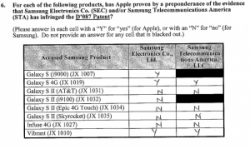 Steve Wildstrom over at tech.pinions argues that the furore over the Apple v Samsung case has been driven in part by reductivist and simply incorrect reporting. He singles out the Washington Post, which published an article asserting that one of the patents at stake was Apple’s so-called Pinch to Zoom behaviour:
Steve Wildstrom over at tech.pinions argues that the furore over the Apple v Samsung case has been driven in part by reductivist and simply incorrect reporting. He singles out the Washington Post, which published an article asserting that one of the patents at stake was Apple’s so-called Pinch to Zoom behaviour:
There’s one serious problem with the first sentence, which was repeated dozens of times in stories in print and on the Web. Apple only has a limited patent (US 7,812,826) on the pinch to shrink, stretch to zoom gesture that is a core element of touch interfaces. And the ’826 patent wasn’t in dispute in the Samsung case because Apple never asserted it.
That’s true enough. I too have grown a little tired of people pointing to 19th Century school slates as prior art. The whole ‘rectangle with rounded corners’ thing is a gross oversimplification of a much more subtle and complex claim. Apple isn’t contending that nobody else gets to make phones and tablets with rounded corners; they’re saying that the overall shape and dimensions of the devices in question is one of many factors that distinguishes their products from others – or should, anyway.
You can’t take a single claim from a patent filing and argue that its lack of originality negates the entire patent. That’s not how these things work. Quite the opposite, in fact. You have to take all of the claims together, and then decide whether they look like a unique creation. Patent claims use painfully obtuse language – often deliberately so. They attempt to perform the almost impossible task of using words to so clearly describing a physical object (or process, but more on that in a bit) that there’s no ambiguity when the questions of copying or originality come up in court.
The kind of patent that Apple’s been most intransigent about are what are called ‘trade dress’ patents. These describe the distinctive features of the device that Apple considers uniquely theirs; they’re used to protect the company from knock-offs and copycats. And copycatting is what Samsung is being accused of.
But when comparing a Samsung device to, say, an iPhone, they’re not just looking at the rectangular shape with rounded corners. They’re looking at that, plus the dimensions, the black front, the ratio of the screen to the border, the placement and colour of the icons on the screen… all of it at once.
Thanks to Steve Jobs, Apple as a company is notoriously painstaking and obsessive about the design and detail of every single thing they make. This hugely intensive creative process is one of the reasons there’s so little variety in Apple’s offerings. They are far more concerned with making one thing perfectly than making a bunch of things well. Apple’s corporate culture is more artisanal in philosophy than any other manufacturer I’ve ever seen. Taste doesn’t just matter; it’s the essence of what they do.
Contrast that with Google. They’re engineers all the way down. The thing that genuinely leaves me breathless when I think about them is their ability to simplify the stupefyingly massive scale of the World Wide Web and filter the entire thing through a single text box. Ask anyone who wrangles data for a living: this really is an astounding accomplishment, and Google are (so far) at the head of their class.
They do have taste, though, and occasionally they’re capable of creating things that are genuinely pleasing. The latest versions of the Android operating system are good examples. But they’re not particularly original. There’s not really anything in that operating system that provides any particular sense of novelty. It’s telling that their biggest effort in recent iterations of the system is something they call ‘Project Butter‘. It’s a system-wide effort to make everything smooth as… well, you know, butter.
If the rumour mill is to be believed – and I think it’s credible in this case – it was precisely this lack of inventiveness that sent Steve Jobs around the bend. He felt robbed because, after showing the world how to make an operating system, Google used it as inspiration for their own. To add insult to injury, Samsung used the OS to bootstrap their own efforts to make tablets and phones that so closely aped Apple’s iconic creations that customers were failing to distinguish between the two offerings. And this is what caused him to launch an all-out war to stop Samsung and to sully Android in the process.
It used to be that companies used their patent portfolios for profit rather than prohibition. IBM is famous for having a small army of lawyers who would appear in tech boardrooms armed with sheaves of patents and make corporate officers an offer they couldn’t refuse: Accept a cross-licensing agreement that allowed the company to continue its work, but also left IBM clear to take advantage of any truly interesting patents the company had in hand. Those companies whose portfolios were lacking in depth were typically required to pay a tithe to continue doing business. It added cost to the products, but it didn’t stop the companies from selling them.
Apple chose to think differently. As they made abundantly clear in their numerous suits brought against against Samsung across the globe, Apple had no interest whatsoever in licensing their ‘trade dress’ patents. They simply wanted Samsung to stop. They were deploying their patents as weapons, not as levers.
The resulting acrimony has so far had decidedly mixed results. The US suit, whose price tag has left most observers goggling, has largely been decided in their favour. In the UK, a judge acerbically observed that whether Samsung had ‘slavishly copied’ Apple was immaterial, because Samsung’s products were easily distinguishable from Apples. They simply weren’t as cool.
If you ask me, he was right. And the reason he was right is what prompted me to write this column.
Wildstrom is right in stating that most tech writers have lost the plot where this story is concerned. But in dithering over the details he too has missed something essential: Patents are designed to give inventors a time-limited monopoly over a particular creation as an incentive for them to share their inner workings. These in turn would inspire others to riff on these inventions, but the law would stop others from claiming the invention as their own.
In the physical world, this works pretty well. When an auto maker invents a new internal combustion engine, other manufacturers can lift the hood and use their understanding of these innovations to drive their own engineering efforts. But they can’t just throw together an identical assembly and call it their own. Take Mazda’s famous ‘wankel’ engine, for example. Patent law doesn’t prohibit me from making a rotary engine of my own; it just stops me from making the same one that Mazda makes.
But this principle doesn’t translate well into the world of software. One of the patents at issue was the behaviour of the user interface when the user scrolls to the end of a long list. Apple made the list ‘bounce’ a bit at the end. It’s a behaviour known as over-scrolling, and it’s a very pleasing, intuitive way, to let someone know they can’t scroll any further. It’s an elegant, more innately human, interaction that lets users know that the system knows what they’re trying to do, rather than simply becoming unresponsive (which is how Microsoft, for example, behaved).
But to assert, as Apple has, that nobody else is allowed to use this behaviour without their permission… well, that’s not what patents were designed for. If we consider how they were originally envisioned, almost the opposite is true. The patent system exists to encourage others to create their own, potentially better way to do it.
There’s a lot of validity to Apple’s desire to discourage copycats. But in their suits against Samsung and others they’ve lost sight of the fact that imitation is an integral part of invention. Edison didn’t invent the first filament lightbulb, he just invented the one with the best materials. Bell riffed on telegraphy and existing voice transmission technology to make voice over the wire possible. Then Marconi came along and effectively developed telegraphs – and later, telephones – without cables. The progression was so clear that for decades radio was known simply as The Wireless.
Yes, Samsung did do point-by-point comparisons between Apple’s interface and their own. But then they went ahead and, taking iOS as their inspiration, created their own. Apple’s objection to this ‘slavish’ copying is arguably an indictment of Samsung’s creativity, but their courtroom tactics are analogous to Alexander Bell taking Marconi to court for using diaphragms in his speakers and microphones.
Samsung’s devices may behave similarly to Apple’s. After all, a smart phone is a smart phone is a smart phone. But just because Apple made the first commercially successful one, or even because others have indulged in the sincerest form of flattery, that doesn’t give Apple any moral right over the idea. If Samsung were trying to pass off their products as iPhones, or if they had stolen trade secrets, source code or materials that were uniquely Apple’s, then the Company That Steve Build might have had a case.
But that’s not the issue here. Samsung’s products are indisputably their own. And yes, yer honour, they’re not nearly as cool.












